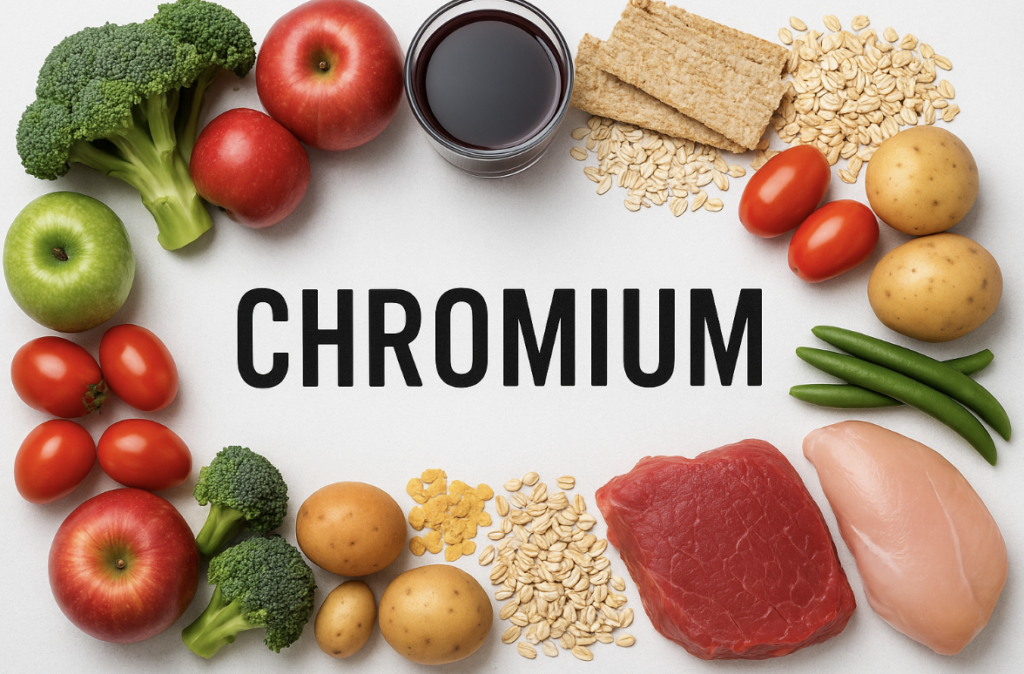Chromium is an essential trace mineral that plays a crucial role in regulating blood sugar, supporting metabolism, and improving insulin sensitivity. Although needed only in small amounts, chromium has a significant impact on energy levels and long-term health. In this post, you’ll discover what chromium does, signs of deficiency, top food sources, and when supplementation might help.
What Is Chromium and What Does It Do?

Chromium enhances the action of insulin, a hormone vital for carbohydrate, fat, and protein metabolism.
✔ Key Functions of Chromium:
- Supports insulin activity and blood sugar control
- Assists in metabolism of carbohydrates, fats, and proteins
- May help manage cravings and appetite
- Contributes to cholesterol balance
- Plays a role in muscle building and weight management
💡 Did You Know? Chromium’s effects are most notable when paired with a healthy diet and exercise regimen.
Top Health Benefits of Chromium

✔ 1. Improves Blood Sugar Control
Chromium enhances insulin sensitivity, making it beneficial for people with prediabetes or type 2 diabetes.
✔ 2. Supports Weight Management
By improving glucose metabolism, chromium may help reduce cravings and support healthy weight loss efforts.
✔ 3. May Improve Heart Health
Some studies suggest chromium can help reduce LDL (bad) cholesterol and increase HDL (good) cholesterol levels.
✔ 4. Boosts Energy Production
Better metabolism of carbohydrates and fats can enhance overall energy levels.
✔ 5. May Help With Brain Health and Mood
Stable blood sugar can positively impact focus, mood stability, and reduce brain fog.
Signs of Chromium Deficiency
⚠️ Common Symptoms:
- Impaired glucose tolerance (higher blood sugar levels)
- Increased cravings for sweets and carbs
- Fatigue and low energy
- Poor mood or irritability
- Slow wound healing
💡 At-Risk Groups:
- People with high sugar diets
- Pregnant and breastfeeding women
- Older adults
- Individuals with diabetes or insulin resistance
- Those with gastrointestinal disorders (reduced absorption)
Best Food Sources of Chromium

🥦 Chromium-Rich Foods:
- Broccoli (one of the best natural sources)
- Grape juice and red wine (moderate amounts)
- Whole grains (oats, barley)
- Green beans and potatoes
- Tomatoes and apples
- Beef, turkey, and chicken
💡 Tip: Processing removes much of the natural chromium in foods—focus on whole, minimally processed choices.
Recommended Daily Intake (RDI)
- Adult men (19–50 years): 35 mcg/day
- Adult women (19–50 years): 25 mcg/day
- Pregnant women: 30 mcg/day
- Breastfeeding women: 45 mcg/day
Chromium Supplement Considerations
💊 Forms Available:
- Chromium picolinate (most popular and well-researched)
- Chromium polynicotinate
- Chromium chloride (less bioavailable)
⚠️ Supplement Tips:
- Doses of 200–1,000 mcg/day have been studied for blood sugar support.
- Always talk to your doctor before starting high-dose chromium supplements, especially if you have diabetes or take medications.
💡 Best Practice: Food first, supplement cautiously if clinically indicated.
Pros and Cons of Chromium
✔ Pros:
- Supports healthy blood sugar and energy
- May assist in weight control and mood regulation
- Easily available through diet and supplements
⚠️ Cons:
- Limited evidence for massive weight loss claims
- High doses may cause mild side effects (headaches, nausea)
- Supplements may interact with diabetes medications
Chromium may be tiny in quantity but it packs a powerful punch for metabolic health. Supporting blood sugar control, energy, and even mood stability, chromium is a smart addition to a healthy diet rich in vegetables, whole grains, and lean proteins. If considering supplements, make sure to pair them with professional guidance for best results.
Read more on vitamin D3 benefits for bone and immune health
Learn more about chromium from the National Institutes of Health
